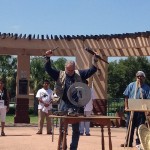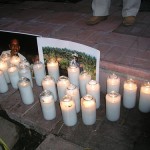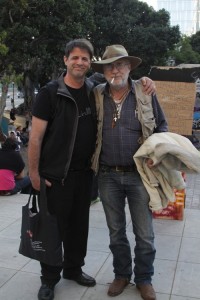Millions of anguished conversations about the murder of so many small children at a Connecticut elementary school have produced new resolve to do something. As the holiday season starts, there is a palpable wave of revulsion against the gun industry, the gun fanatics, and the powerful lobbyists who have intimidated our political representatives into allowing all manner of guns – even military style weapons – to be widely and easily available.
Now, with a sense of sea change in public attitude, politicians are waking up. Several unlikely Democrats have spoken in favor of the initiative by Senator Dianne Feinstein (D. CA) to reintroduce the now expired ban on assault weapons she successfully championed in the mid 1990s. Meanwhile, for the first time, the Obama Administration is tentatively articulating leadership on gun regulation. If President Obama commits to strong and sensible gun regulation, we should have his back.
This new commitment to at least talk about gun restriction is heartening. Nevertheless, those, such as myself, who have watched previous waves of horror sweep in, and then recede in the wake of other gun-murder outrages, know we need a broad and resilient coalition against gun violence. We have to be able to win battles now as well as in future confrontations with gun industry interests.
A coalition that can effectively parry the U.S. gun lobby needs to work at a local, state, national, and international level. Locally, we need to involve the representatives of communities and neighborhoods most affected by the more than 30,000 annual gun homicides in the United States in the evolving conversation about how to make our communities safe. At the state level we need to work with legislators like California Senator Leland Yee (D-San Francisco/San Mateo) who is working (with our partners at the Brady Campaign and other Senators like Kevin de Leon, (D-Los Angeles) to make California a laboratory for sensible and exemplary gun policies.
At the national level we need vision and leadership from an Administration that has not previously engaged the difficult politics of gun control. For more than a year, we have worked with allies from Mexico, Washington and important networks like Presente.org to petition Obama to use executive power to ban the import of assault to the U.S. This request to President Obama was a central element of the Mexican Caravan for Peace that crossed the country last summer, led by victims of the wave of violence 60,000 and counting – fueled by drug profits and guns smuggled from the U.S.
Restoring the ban on assault weapons, as Senator Dianne Feinstein seeks to do, would be a vital first step that would go much further than any available executive action to limit access to military style assault weapons. But passage, even such a common sense bill, is by no means guaranteed. Those who profit from the gun trade and their lobbyist enablers like the NRA have a strong grip on the leash of legislators, especially the Republican who control the House of Representatives.
For sensible gun control measures to succeed, the local political math must change. That is why sea change moments – when Washington’s policy silos disappear momentarily and the grief of a few moves the hearts of millions – are so important.
Such a moment came in Mexico when the Mexican President Calderón suggested that 14 teenage victims of an October 2010 massacre at a birthday party in the border town of Ciudad Juarez were linked to organized crime. In fact, the teens were all football players mistakenly targeted by cartel hit men. Later, when the boy’s mothers confronted the President about this during a televised meeting the video of the encounter went viral and caused an opinion watershed and eventually a powerful movement led by victims of Mexico’s drug war. This is the same movement that crossed the border to dramatically make the case for steps to regulate assault weapons in 29 US cities last summer.
As the New Year dawns and members of Congress will likely face decisions about how to weigh in on restoring the assault weapons ban and other possible gun control legislation. We must keep alive the urgency of these initiatives even as attention to the families and victims of Newtown recedes.
Constituent pressure on specific members of Congress will be key to any legislative success. Additionally, the voices of people from both sides of the border with loved ones lost to this long plague of gun violence bring a powerful and morally urgent voice to this conversation. There is no question that banning assault weapons would benefit the security and safety of Mexican border communities. Ending the large scale smuggling of assault weapons used by criminals throughout Mexico is human and national security priority.
As the year closes people gather. I hope we can all look each other in the eyes and muster the courage to ask what kind of world we want to live in and how we can love and work together to get there.
Please join the call on President Obama to stop the flow of assault weapons into our communities.
Most of the 60,000 people killed in Mexico as a result of the “Drug War” were killed with guns sold in the U.S. Tell President Obama that you don’t want greedy gun merchants selling assault weapons, built for war, into our communities where they are then used to massacre tens of thousands of innocent people on both sides of the border.




